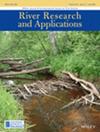太平洋三叉鳗成鱼的时空分布与栖息地破碎化的关系
IF 1.9
4区 环境科学与生态学
Q4 ENVIRONMENTAL SCIENCES
引用次数: 0
摘要
太平洋灯鱼(Entosphenus tridentatus)是一种原产于美国西北太平洋地区的鱼类,具有独特的文化和生态价值,但由于普遍缺乏系统监测,确定其空间和时间分布具有挑战性。在这项研究中,我们利用太平洋鳗鱼红点计数,根据包括人工障碍物在内的环境协变量,建立了太平洋鳗鱼的出现概率和丰度模型,假定预测的鳗鱼红点越高,就意味着产卵栖息地越合适。通过使用广义线性混合零膨胀模型,结果表明太平洋灯鱼的丰度通常在梯度较高、离海洋较远的溪流中较低。春季水温较高且历史中位春季流量较大的溪流,其丰量较高。灯笼鱼的出现主要受春季水温和距离海洋远近的影响。我们进一步观察到,当溪流温度超过 18 摄氏度时,丰度估计值的置信区间会扩大,零膨胀增加,表明出现率下降。这项研究的目的之一是建议应优先清除或修复哪些障碍物,以增加通道,从而增加进入上游栖息地的机会。我们认为人工障碍物主要通过通道影响出现概率。该模型中的障碍变量对灯鱼出现概率有负面影响,但在模型中并不是一个强有力的预测因素。虽然根据这些模型结果,我们无法提出最有利于移除或改善障碍物的具体地点,但我们可以确定哪些流域更有可能支持太平洋灯鱼,并通过改善栖息地的连通性来提供潜在的额外栖息地。将恢复和/或清除障碍的重点放在俄勒冈海岸中南部地区具有较高栖息地适宜性的流域(即阿尔海河、西斯劳河、库斯河、科基尔河和西塞斯河),可以优先使用有限的资金,提高太平洋灯鱼以及其他本地灯鱼和洄游物种(如鲑鱼、钢头鱼;Oncorhynchus)的受益概率。尽管本手稿的重点是俄勒冈海岸地区,但其方法可移植到存在太平洋灯鱼的其他地区。本文章由计算机程序翻译,如有差异,请以英文原文为准。
Spatio‐temporal distribution of adult Pacific lamprey Entosphenus tridentatus relative to habitat fragmentation
Pacific lamprey (Entosphenus tridentatus ), a fish species native to the Pacific Northwest (USA), have distinctive cultural and ecological value but determining their spatial and temporal distribution is challenging due to a general lack systematic monitoring. In this study, we used counts of Pacific lamprey redds to model the probability of occurrence and abundance of Pacific lamprey based on environmental covariates including artificial barriers, assuming higher predicted lamprey redds translates to more suitable spawning habitats. Using generalized linear mixed zero‐inflated models, results suggest that Pacific lamprey abundance was generally lower in high gradient streams, further from the ocean. Stream reaches with warmer spring water temperatures and greater historical median spring flows supported higher abundances. Lamprey occurrence was primarily influenced by spring water temperatures and distance from the ocean. We further observed that when streams warm beyond 18°C, confidence intervals around the abundance estimates widen and zero‐inflation increases, indicating a decrease in occurrence. One objective of the study was to recommend where barrier removal or restoration should be prioritized to increase passage and thus access to upstream habitats. We considered artificial barriers to primarily influence the probability of occurrence through access. The barrier variable in this model had a negative effect on the probability of lamprey occurrence, but it was not a strong predictor in the model. While we are not able to suggest specific locations that would most benefit barrier removal or improvement based on these model results, we can identify the watersheds with a higher probability to support Pacific lamprey and provide potential additional habitats by improving habitat connectivity. Focusing restoration and/ or removal of barriers on watersheds in the Mid‐South region of the Oregon Coast (i.e., Alsea, Siuslaw, Coos, Coquille, and Sixes rivers) with higher habitat suitability could prioritize use of limited funds, increase the probability of benefiting Pacific lamprey, and potentially other native lampreys and migratory (e.g., salmon, steelhead; Oncorhynchus ) species. Although this manuscript focuses on the Oregon Coast region, the methods are transferrable to other regions where Pacific lamprey are present.
求助全文
通过发布文献求助,成功后即可免费获取论文全文。
去求助
来源期刊

River Research and Applications
环境科学-环境科学
CiteScore
4.60
自引率
9.10%
发文量
158
审稿时长
6 months
期刊介绍:
River Research and Applications , previously published as Regulated Rivers: Research and Management (1987-2001), is an international journal dedicated to the promotion of basic and applied scientific research on rivers. The journal publishes original scientific and technical papers on biological, ecological, geomorphological, hydrological, engineering and geographical aspects related to rivers in both the developed and developing world. Papers showing how basic studies and new science can be of use in applied problems associated with river management, regulation and restoration are encouraged as is interdisciplinary research concerned directly or indirectly with river management problems.
 求助内容:
求助内容: 应助结果提醒方式:
应助结果提醒方式:


